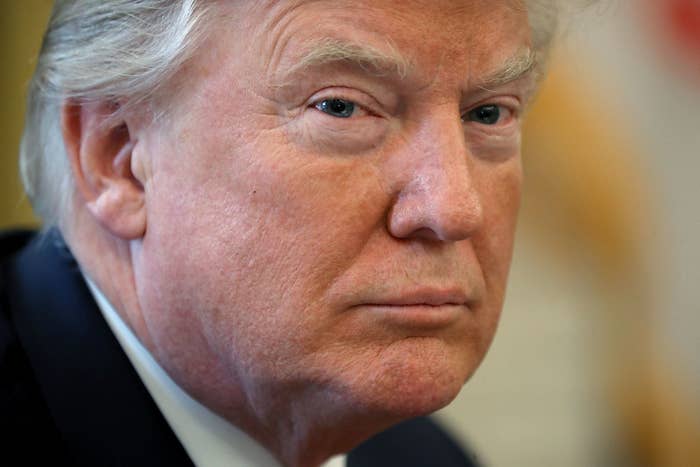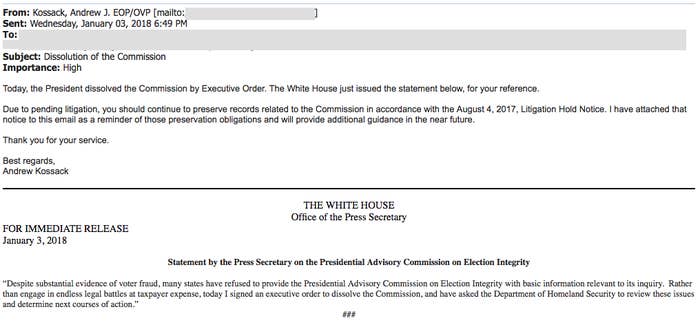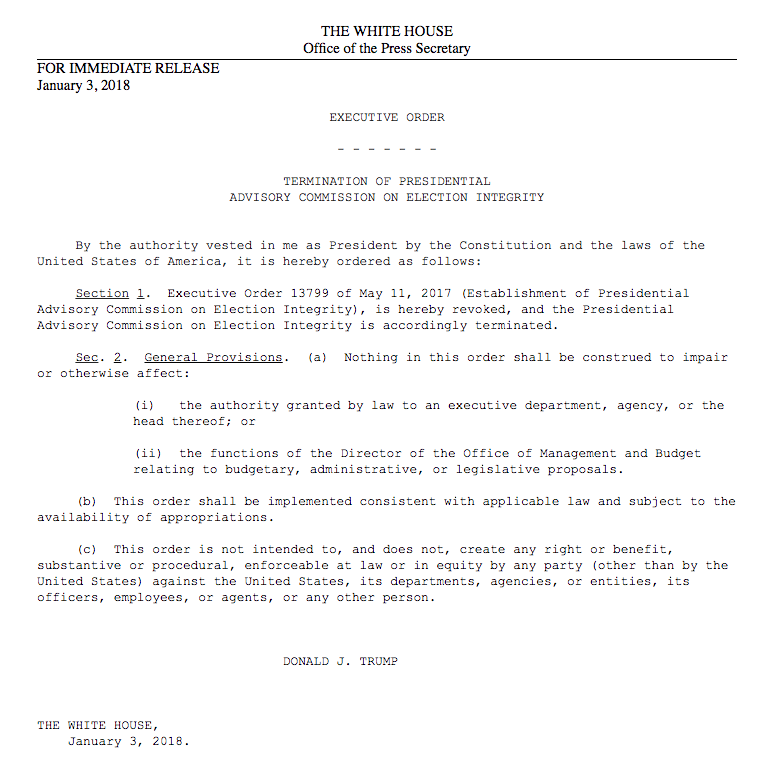
President Trump has dissolved his election integrity commission, with the White House blaming states for refusing to turn over voter data as well as the lawsuits that have dogged the commission since Trump announced it in May.
The White House announced Trump's decision late Wednesday and sent the text of the executive order revoking the May order that created the commission soon after.
In a statement, press secretary Sarah Huckabee Sanders repeated Trump's oft-made claim of voter fraud, but said that "rather than engage in endless legal battles at taxpayer expense," Trump had ended the commission and asked the Department of Homeland Security to take up the review of US election systems.
On Thursday morning, Trump tweeted that the "system is rigged" and called for a move toward "voter ID."
"Many mostly Democrat States refused to hand over data from the 2016 Election to the Commission On Voter Fraud. They fought hard that the Commission not see their records or methods because they know that many people are voting illegally. System is rigged, must go to Voter I.D.," he tweeted.
He followed that up with another tweet asking Americans to "push hard for voter identification."
Democrats and civil rights groups criticized the commission from the start, accusing the administration of using it as a pretext for suppressing minority voters. The Trump administration faced a string of lawsuits challenging the legality of the commission itself as well as its efforts to collect voter data from states.
Most recently, the commission was sued by one of its own members, Maine Secretary of State Matthew Dunlap, a Democrat, who claimed he was blocked from getting information about the group's activities. In the lawsuit, Dunlap's lawyers said that the commission's "superficial bipartisanship has been a facade."
A judge on Dec. 22 had ordered the commission to provide Dunlap with some of the materials he had requested. Dunlap said in a statement on Wednesday evening that the president's order dissolving the commission "came without warning."
'“The lack of transparency brought nothing but suspicion onto the work of the commission, which bankrupted it of any chance at public legitimacy. While this chapter is now closed, I am committed to remaining vigilant on the front of election integrity and the transparent, free, and fair conduct of elections," Dunlap said.
In a phone interview with BuzzFeed News later in the evening, Dunlap said that although he didn't get advance notice of the president's decision, he wasn't surprised by the announcement.
"I wondered if they might not go in this direction simply because of the court order and everything seemed to be working in a pretty dysfunctional way from the beginning," he said.
Dunlap provided BuzzFeed News with a copy of an email time-stamped at 6:49 p.m. on Wednesday from the commission's designated federal officer, Andrew Kossack, notifying the commission members about the president's decision to dissolve the group. The White House sent out the public release around the same time. Kossack in the email advised the commission members that because there were still lawsuits pending, they should continue to preserve records concerning the commission. "Thank you for your service," Kossack wrote. The email's subject line was "Dissolution of the Commission."

American Oversight, a government transparency advocacy group representing Dunlap along with lawyers from the law firm Patterson Belknap Webb & Tyler, said in a statement that it would continue to fight in court for access to records about the commission's activities.
"It’s no coincidence that the president dissolved the commission once it became clear it wouldn’t be permitted to operate in the shadows," American Oversight Executive Director Austin Evers said in the statement. "Secretary Dunlap deserves our gratitude for stepping into the breach to take on adversaries of democracy. We intend to continue to fight for his right to access to the commission’s secret communications. President Trump can dissolve the commission, but the law doesn't allow him or the commission to slink away from view and avoid accountability.“
The commission was chaired by Vice President Mike Pence, but its driving force was Kansas Secretary of State Kris Kobach. It was Kobach who sent a letter to states in June seeking information from their voter rolls. The majority of states — including some led by Republican state officials — refused to fully comply with the request, although many did provide information that was already public, according to press reports.
Kobach told the Topeka Capital-Journal last week that although the commission's work had been delayed because of the lawsuits, it would meet in January. The group's last meeting was in September.
Dunlap's case was one of eight pending lawsuits against the commission. Shortly after the White House announced that Trump had dissolved the commission on Wednesday, the Justice Department filed notices in each of the cases alerting judges to the development.
A spokeswoman for Kobach did not immediately return a request for comment.
Hans Von Spakovsky, a member of the commission and a senior legal fellow at the conservative Heritage Foundation, said in an email to BuzzFeed News that he was disappointed with the commission's dissolution, but understood Trump's reason for doing it, citing the refusal of states to provide data and the pending lawsuits. Von Spakovsky said he wasn't consulted in advance about the president's decision to dissolve the commission and found out about it from the same email that Dunlap and other commission members received.
"The obstacles and impediments used to hinder the work of the Commission is evidence that there are many politicians and activists who want to prevent the American people from finding out the truth," Von Spakovsky wrote.
Here is the executive order that Trump signed on Jan. 3 revoking the executive order that created the commission:

This is a developing story. Check back for updates.

